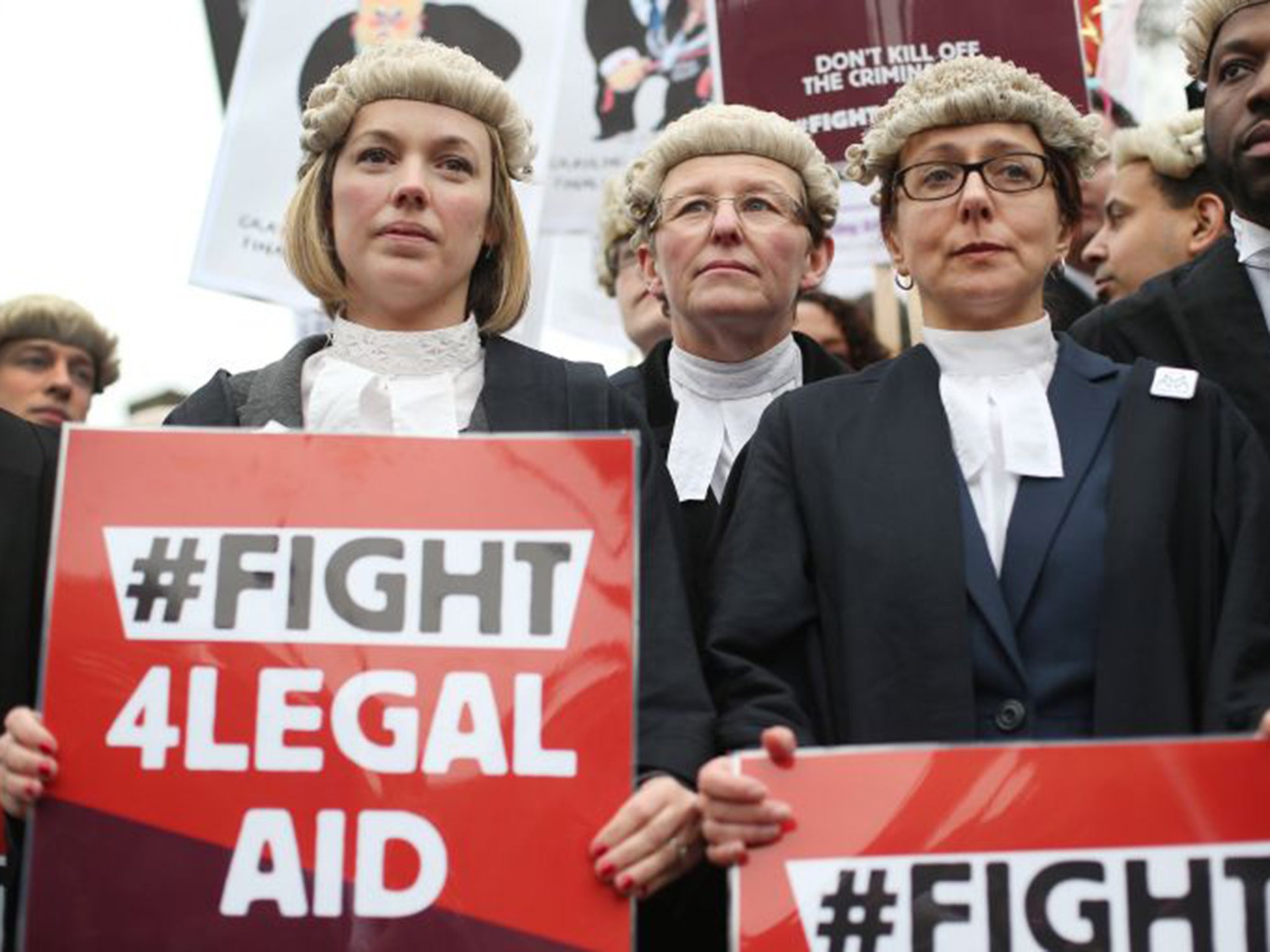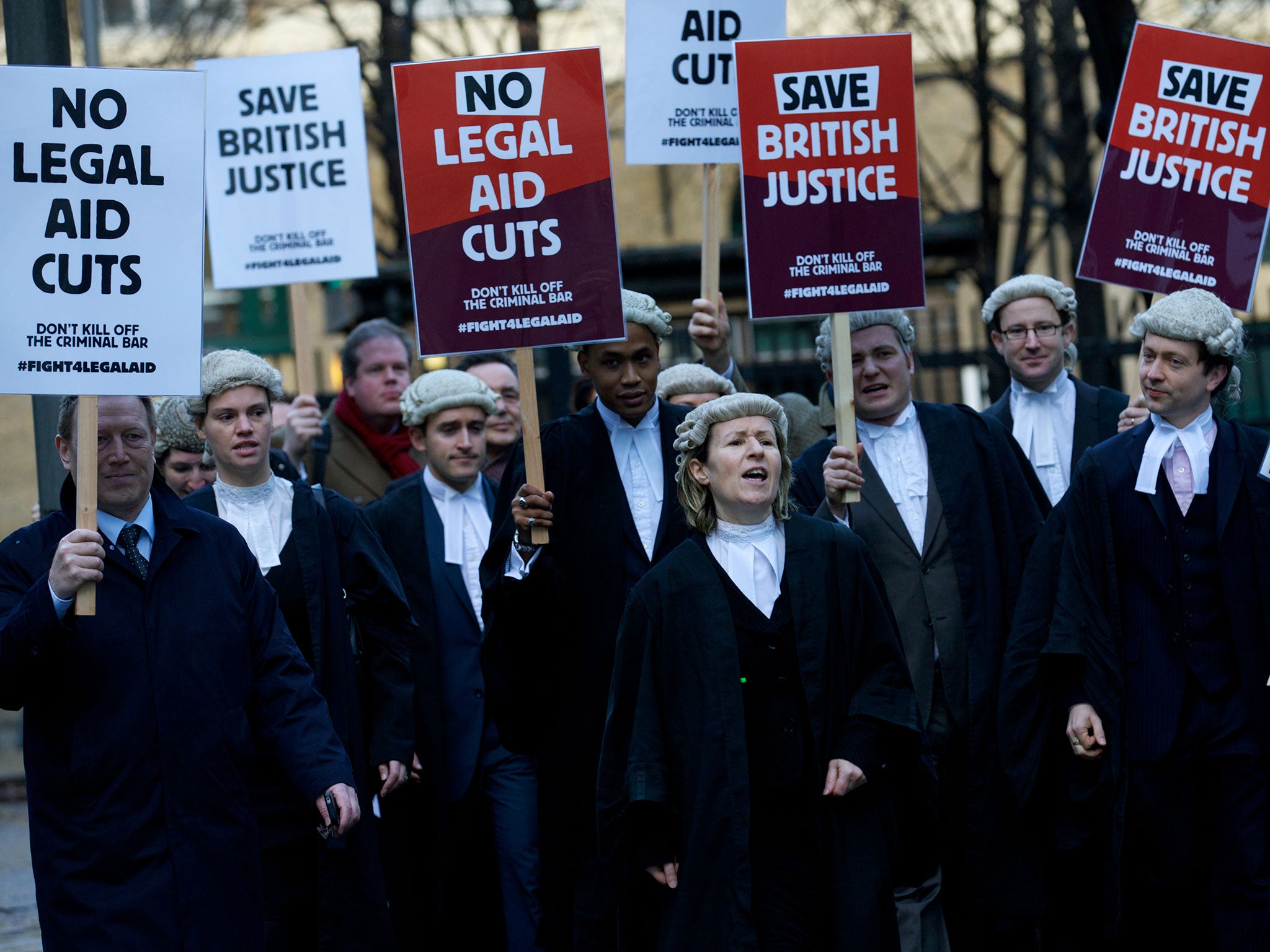Lawyers call for strike over 'relentless legal aid cuts'
Ministry of Justice says changes do not represent a cut to barristers’ fees

Your support helps us to tell the story
From reproductive rights to climate change to Big Tech, The Independent is on the ground when the story is developing. Whether it's investigating the financials of Elon Musk's pro-Trump PAC or producing our latest documentary, 'The A Word', which shines a light on the American women fighting for reproductive rights, we know how important it is to parse out the facts from the messaging.
At such a critical moment in US history, we need reporters on the ground. Your donation allows us to keep sending journalists to speak to both sides of the story.
The Independent is trusted by Americans across the entire political spectrum. And unlike many other quality news outlets, we choose not to lock Americans out of our reporting and analysis with paywalls. We believe quality journalism should be available to everyone, paid for by those who can afford it.
Your support makes all the difference.Thousands of lawyers have been urged to refuse legal aid work in protest against cuts by the government which have left the criminal justice on the brink of “collapse”.
The Criminal Bar Association (CBA) said 90 per cent of barristers surveyed supported the move as part of the “fight to improve the justice system for us and everyone else”.
The group, which represents almost 4,000 members, is demanding the Ministry of Justice delays a controversial new funding scheme for legal aid work that is due to come into force on Sunday.
The move comes as the MoJ is facing intense pressure over its role in the decision to release serial sex attacker and rapist John Worboys. The parole board’s decision to recommend Worboys be freed was overturned by the High Court this week after an appeal by his victims.
David Gauke, the justice secretary, was accused of “scapegoating” the head of the Parole Board, Nick Hardwick, and forcing him to resign, despite admitting that civil servants had not handed over all the information needed for the black cab rapist’s hearing.
The CBA has claimed the entire criminal justice system is “in chaos” and that legal aid work is being undermined to save money.
The government claims that a new system to pay lawyers representing those who cannot afford their fees – the Advocates’ Graduated Fee Scheme (AGFS) – was developed with input from barristers and did not represent a cut to their income.

But the CBA called it the “final straw”. “The criminal justice system is collapsing,” it said. “Very recently the disclosure crisis has highlighted the appalling state of our system.
“Prisons, courts, the police and probation services are underfunded and in chaos. The impoverishment of the system is well known to the government and MPs.”
The CBA accused the government of refusing to properly fund legal aid, which helps meet the costs of advice and representation for people unable to hire a lawyer themselves.
Barristers boycotted hearings in 2014 and 2016 over cuts to the system and limits imposed on its scope, with the impact of the changes already under review.
The CBA said the “poor and vulnerable in society are being denied access to justice” and that lawyers’ fees had been cut by almost 40 per cent over the past two decades, causing a recruitment crisis.
“The system is desperate, as are we,” said chair Angela Rafferty QC. “We are the people who fairly prosecute and fearlessly defend.
“Without us people would now be locked up. Without us, the guilty would have walked free. Without us and our goodwill the system would have broken long ago.”
Several high-profile chambers and associations have announced their support for the action, including the Bar Council and Law Society of England and Wales.
The Young Legal Aid Lawyers, representing those at the start of their careers, said Britain’s legal system was being “propped up only by the goodwill of barristers and solicitors who are forced to work for free”.
A spokesperson for the Ministry of Justice said: “We are extremely disappointed with the position the Criminal Bar Association has taken today, especially given that they and other members of the bar participated fully in the design of the scheme.
“Our reforms will reflect the actual work done in court, representing better value for the tax payer, and will replace an archaic scheme under which barristers were able to bill by pages of evidence.
“We greatly value the work of criminal advocates and will continue to engage with the bar moving forwards.”
The CBA said it entered negotiations in 2015 in good faith but the government insisted on “cost neutrality” rather than increased funding for legal aid.
The budget for justice is forecast to fall by £400m next year, it added, from £6.6bn in 2017/18 to £6.2bn in 2018/19, then to £6bn for 2019/20.
The CBA stressed that barristers can decide for or against taking action themselves, but called on them to “refuse instructions on all cases subject to a representation order” – legal aid –from 1 April onwards.
It will be mounting days of action while calling on the government to delay the implementation of the AGFS scheme or suspend it for further consultation.
Critics want the system to be changed so lawyers are paid extra for high volumes of material disclosed, following the collapse of rape cases because phone evidence was not properly examined.
Advocates said previous negotiations had already increased the budget by £9m and that the reforms will create a simpler, fairer and more modern payment scheme.
Join our commenting forum
Join thought-provoking conversations, follow other Independent readers and see their replies
Comments